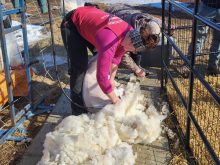NASHVILLE, Tenn. – Major food retailers and processors claim the mandatory country-of-origin labelling law is unworkable.
The retail sector also told the National Cattlemen’s Beef Association it will not accept responsibility if a member is charged with mislabelling its products.
“If we get fined for it, we will be looking for you to reimburse us,” said Deborah White of the retailers’ Food Marketing Institute.
Retailers are subject to a $10,000 fine for each labelling violation.
Grocery stores rely on the integrity of supplier records to verify the country of origin on beef, pork, produce and peanuts as well as farmed and wild fish. Those records must be retained for two years. They must begin with the primary producer to prove cattle, hogs and sheep were born, raised, slaughtered and processed in the United States to receive the domestic label.
Read Also

Charges laid after cattle theft
Saskatchewan RCMP lay two charges against a man after six cattle went missing.
White said the record keeping demands are too cumbersome, especially for perishable produce.
“Does it really matter about a tomato sold 18 months ago?” she said.
The retailers and processors said suppliers might be asked for signed contracts to ensure they are maintaining a verifiable audit trail. Retailers also want third party audits to guarantee products carrying American labels are true.
Retailers plan to push responsibility back to the packers. They may request more case ready goods that are properly labelled at the plants to avoid liability.
Packers will then demand perfect records from feedlots and cow-calf operators, said Mark Dopp, who represented packers.
In addition, packers will do what is necessary to ensure compliance. While the law said the secretary of agriculture cannot impose mandatory animal identification, packers may demand it from producers.
American animals that cannot be traced may end up in the lower priced food service sector, which is exempt from the rule.
American beef producers were told to start record keeping programs for calves born this year because some of them could potentially be for sale in the fall of 2004 when the legislation becomes mandatory.
Barry Carpenter of the U.S. Department of Agriculture agreed the law is complex.
The labels must name the country of origin. State identifications such as California Grown, Iowa Pork or Idaho Potatoes are not acceptable under this program.
USDA officials are willing to help producers set up acceptable record keeping programs.
“Likely the marketplace will dictate the level of records they expect people to have to give them a level of comfort,” said Carpenter.
The beef industry is facing an added cost, although no one can verify the amount. That is under assessment at the USDA and public comment on the law is being sought, said U.S. secretary of agriculture Ann Veneman in an address to the NCBA Jan. 30.
Some producers said packers and retailers are using scare tactics to defeat a law they do not want.
They argued consumers want to know country of origin because they have already complained about animal feeding practices, antimicrobial use and humane practices.
Rosemary Mucklow, executive director of the National Meat Association representing beef and pork processors, said the legislation is nonsensical and creates logistical problems because of the way meat is processed and distributed.
“Anybody who has any understanding of trade knows that this is not workable,” she said. “We’re hopeful that NCBA will understand that this is negative to their industry.”
Mucklow hopes the law can be repaired.
However, Congress is likely receiving mixed messages from the agricultural community. Groups like the American Farm Bureau narrowly voted in support of the legislation and individual states commodity groups have favored it.
For further information on this bill, go to www.producer.com and click on Links in the News.

















